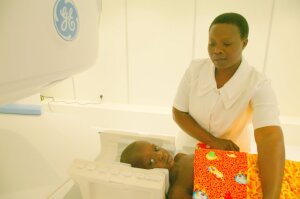by
Gus Iversen, Editor in Chief | March 20, 2015

A child is prepared for MRI at
the Queen Elizabeth Hospital
in Blantyre, Malawi, Africa.
Photo by Terrie Taylor, MSU
The malaria parasite ends the lives of roughly 1,300 children every day — and most of them are in Africa, where roughly 15 to 25 percent of cases are fatal.
Although malaria can be killed with drugs, finding ways to treat the effects of the disease has troubled physicians because the pathogenetic processes by which it operates are unknown.
By using an MRI provided by GE Healthcare, a team from Michigan State University led by Dr. Terrie Taylor, were able to gain previously unknown insights into how malaria operates in children at the Queen Elizabeth Hospital in Blantyre, Malawi.



Ad Statistics
Times Displayed: 46035
Times Visited: 1397 MIT labs, experts in Multi-Vendor component level repair of: MRI Coils, RF amplifiers, Gradient Amplifiers Contrast Media Injectors. System repairs, sub-assembly repairs, component level repairs, refurbish/calibrate. info@mitlabsusa.com/+1 (305) 470-8013
In their work, the researchers confirmed a long-held hypothesis that cerebral malaria is sometimes fatal because it triggers massive swelling in the brain. Traditional autopsy could never confirm this suspicion because any pressure on the brain would be relieved in the process of opening the skull.
“The next step is to identify what’s causing the swelling and then develop treatments targeting those causes," said Dr. Terrie Taylor, lead researcher. "It’s also possible that using ventilators to keep the children breathing until the swelling subsides might save lives, but ventilators are few and far between in Africa at the moment.”
Since 2008, the National Institute of Allergy and Infectious Diseases of the National Institutes of Health, has funded the MRI scans of hundreds of African children by Taylor and her team. Going forward, the goals will be to better understand the swelling and develop ways to relieve it.

